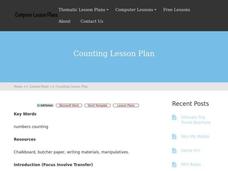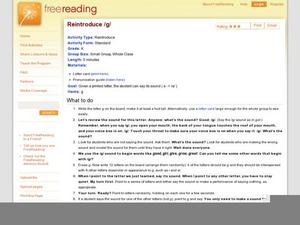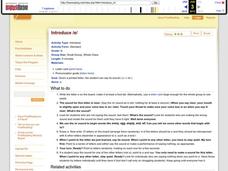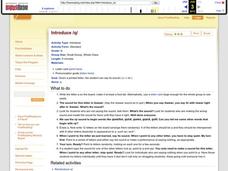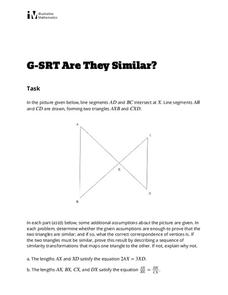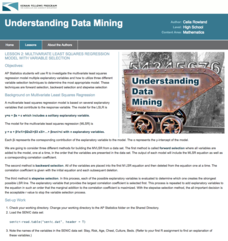Curated OER
Improve Your Spelling with the Visual Thesaurus
Using Visual Thesaurus software, class members participate in a computer-based spelling bee. Then they work in groups to analyze the words and use deductive reasoning to infer spelling patterns. They then present one of their "rules" to...
Curated OER
Early English Settlement
Fifth graders encounter the TCI History Alive Assessment. Create a rubric together with other students. Use graphic organizers to brainstorm challenges that one would face attending school in a foreign country.
Curated OER
Extending Online Number Sequences
In this online number sequences worksheet, students work out the answers to eight comprehensive exercises with thirty-eight calculations involving a variety of sequences. Students answers are automatically graded online as they go and...
Curated OER
House on Mango Street
Students complete a guided reading study and autobiographical essay for Sandra Cisneros' House on Mango Street. For this literary analysis lesson, students read the novel, complete novel response activities, book review worksheets, and...
Curated OER
Coloring Ball: Color By Number Worksheet
In this counting/coloring activity, students follow directions to color designs on a large ball that correspond to numbers. Worksheet is designed for fine motor and basic counting practice.
Curated OER
Investigation - The Bakery Shop
Students use manipulatives to establish quantity. By singing a song titled "Five Little Cookies," students determine which strategy to use to find out how many cookies are left in the bakery shop.
Curated OER
I Can Use a Worm to Count
Kindergarteners use worms, puppets or other props to practice counting to 100. First, they listen to a read aloud of Count Worms by Roger Hargeaves. A worm pattern is used to count to 100, with each segment of the worm...
Curated OER
Introduce Last Sound Segmenting (Mico Version)
What is Mico trying to say? Use a puppet to make this final-phoneme activity more engaging for kindergartners. Using three picture cards at a time (included), they listen to him say a final sound. To which of the three images is he...
Curated OER
Counting Lesson Plan
In whole group practice, children count together and identify how many objects are drawn on butcher paper, increasing the number when they have achieved fluency. In pairs, they count manipulatives. They then copy series of numbers from...
Curated OER
Introduce Soft-C
Do your emerging readers know that letters sometimes borrow the sounds of other letters? Explore the soft /c/ sound, explaining that c has borrowed the sound from s. After giving scholars some examples of words that begin...
Curated OER
Introduce /r/
Use these inventive strategies to focus on the letter r, forming sound associations along with letter recognition. Explain the tongue movement in making the /r/ sound, asking learners to try it. Draw the r on the board and give...
Curated OER
Using Numbers Everywhere
Kindergarteners explore various representations and uses of numbers to develop number sense. They participate in an activity and arrange patterns into groups. Students compare the sets and describe the objects in each set.
Curated OER
Introduce /a/
Start your alphabet study strong using these strategies combining pronunciation, recognition, letter sound, and word examples focused on the letter a. Scholars examine the letter shape and listen to you pronounce the /aaa/ sound. As you...
Curated OER
Reintroduce g
Synthesize pronunciation, recognition, letter sound, and word examples as scholars learn all there is about the letter g. They examine the letter shape and listen to you pronounce the hard /g/ sound. As you explain how this sound is...
Curated OER
Introduce /e/
Examine the most-used letter in the English language incorporating pronunciation, letter recognition, letter sound, and word examples for the letter e. Scholars examine the letter shape and listen to you pronounce the /eee/...
Curated OER
Galileo's Thermometer: Measuring the Density of Various Unknown Liquids
Sprouting scientists explore the concept of density by making mass and volume measurements for five different liquids. From these measurements, they calculate densities. They apply their learning to explain Galileo's thermometer works...
Curated OER
Introduce /Q/
Everything your pre-readers need to know about the letter Q is right here; this strategy combines pronunciation, letter recognition, sound, and word examples. Scholars examine the letter shape and listen to you pronounce the /kwww/...
Curated OER
Phonemic Awareness: Blending
First graders listen closely as their teacher sounds out a variety of words, one phoneme at a time. They then practice blending sounds to create words on their own. Tip: While you sound out words have your class write down each phoneme...
Pearson
Transcription
Teach young biologists the language of life with this series of worksheets on DNA. By working through these pages, students expand their understanding of genetics as they learn about the process of transcription and the...
Illustrative Mathematics
Are They Similar?
Learners separate things that just appear similar from those that are actually similar. A diagram of triangles is given, and then a variety of geometric characteristics changed and the similarity of the triangles analyzed. Because the...
Kenan Fellows
Multivariate Least Squares Regression Model with Variable Selection
The risk of contracting an infection in the hospital is low, but it does happen. Learn what risk factors have the highest correlation with hospital-acquired infections in the final lesson of a three-part series. Using the open source R...
EngageNY
Base Angles of Isosceles Triangles
Build confidence in proofs by proving a known property. Pupils explore two approaches to proving base angles of isosceles triangles are congruent: transformations and SAS. They then apply their understanding of the proof to more complex...
Balanced Assessment
A Loud Noise
In a scale measuring noise, an increase in 10 dB is a 10 time increase in power. Mathematicians examine the data graph of a real world exponential growth, with no logarithmic scale, and then create two equations relating the...
EngageNY
Properties of Parallelograms
Everyone knows that opposite sides of a parallelogram are congruent, but can you prove it? Challenge pupils to use triangle congruence to prove properties of quadrilaterals. Learners complete formal two-column proofs before moving on to...










